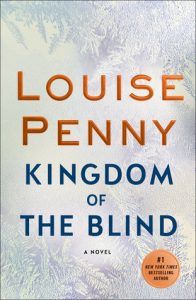 All good writers have themes they like to re-explore and think through in many of their books. In Kingdom of the Blind Louise Penny returns to a theme that has long been of interest to her, that of the unreliability of mere appearances. The pleasant facade masking rot within. As she focuses thematically on the yin and yang of her characters and thoughts – at one point, Gamache thinks to himself “that conversation had gone both well and badly. Was comforting and nauseating. Successful and humiliating”, she forces the reader to examine his or her own preconceptions.
All good writers have themes they like to re-explore and think through in many of their books. In Kingdom of the Blind Louise Penny returns to a theme that has long been of interest to her, that of the unreliability of mere appearances. The pleasant facade masking rot within. As she focuses thematically on the yin and yang of her characters and thoughts – at one point, Gamache thinks to himself “that conversation had gone both well and badly. Was comforting and nauseating. Successful and humiliating”, she forces the reader to examine his or her own preconceptions.
And she forces the reader, while reading, to carefully consider each character as they are introduced onto the canvas of her story. This particular installment begins with Gamache and Myrna heading to an appointment at a rundown, secluded farmhouse near Three Pines, where they meet two strangers. One is a notary who is executing a will, and to the surprise of Gamache, Myrna and Benedict, a young builder from Montreal, they are the liquidators (in the states we’d refer to them as the executors) of a stranger’s will.
The stranger, who called herself the Baroness, is eventually recalled by Ruth Zardo to have been a cleaning woman. Someone who is seen, but overlooked. She has left her three children fifteen million dollars, and there seems to be no possible way she has left them even fifteen dollars, much less fifteen million. The three children – two men and a woman – seem unfazed by their mother’s claims but neither do they expect to inherit anything other than the falling down house where they were raised.
When one of the three is killed in an accident – or is it a murder? – the real investigation into the Baroness’ estate begins.
Meanwhile Inspector Beauvoir is dealing with the fallout of Gamache’s final actions in the last book (Glass Houses), which released a large quantity of an incredibly powerful opioid onto the streets of Montreal. Gamache is suspended but desperately attempting to find the drugs before they hit the streets and start killing people. He’s also being asked to assist in the murder investigation by Inspector Beauvoir.
In keeping with the theme of the novel, there are two metaphorical “streets” in the narrative. There’s the “street” of the financial world, where the Baronesses’ two sons are employed and where much of the murder mystery takes place; and there are the literal streets of Montreal, the ones populated by junkies, prostitutes and in general, the desperate and poor. Penny does not seem to find one “street” less important than the other, and I think that is her point. A junkie may have goodness hidden underneath, just as a financial broker may have evil hidden underneath the surface. ‘
Appearances don’t matter – at least to this author, though not always, alas, to the rest of the world – so keep that in mind as you read. As always all these themes are wrapped up in a well paced and plotted mystery that will have you flipping pages faster and faster as you reach the end of the book. This is another fine installment in one of the greatest mystery series being written at the moment.